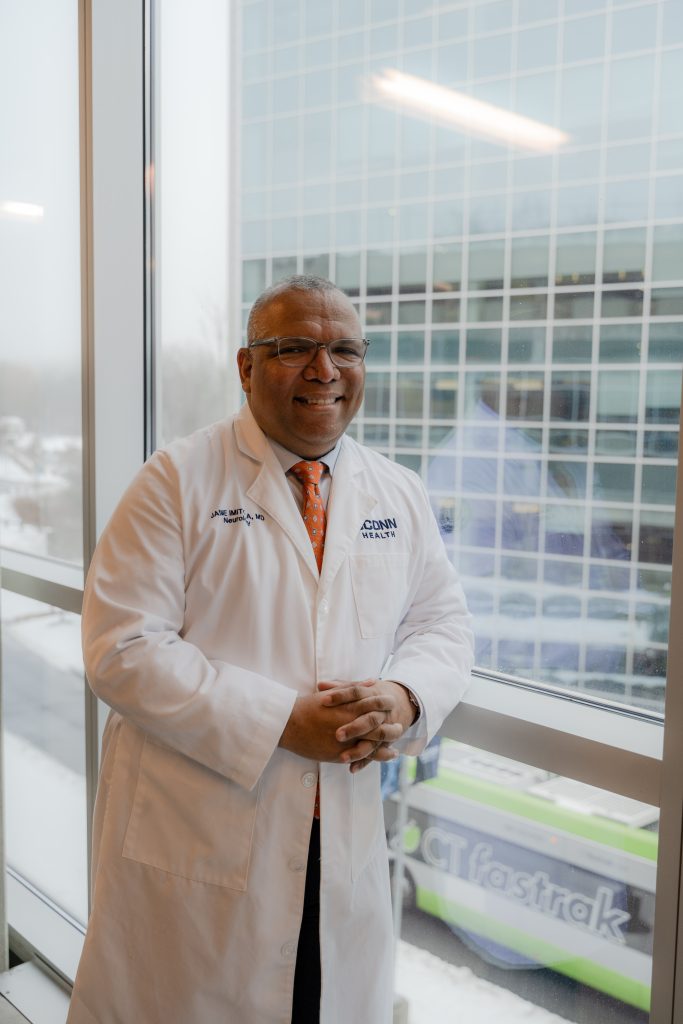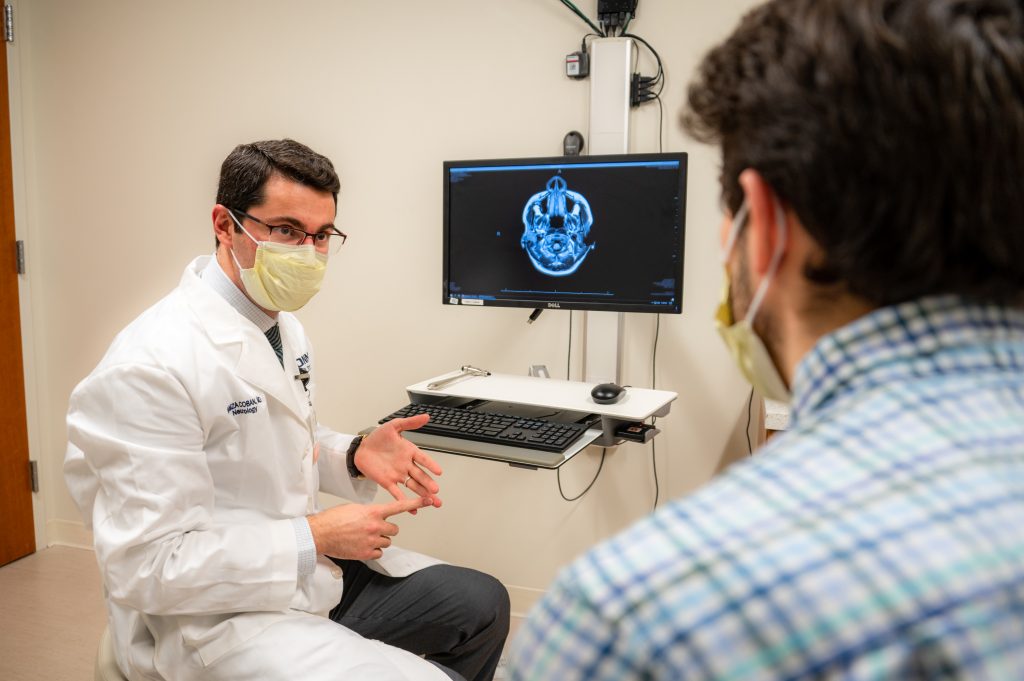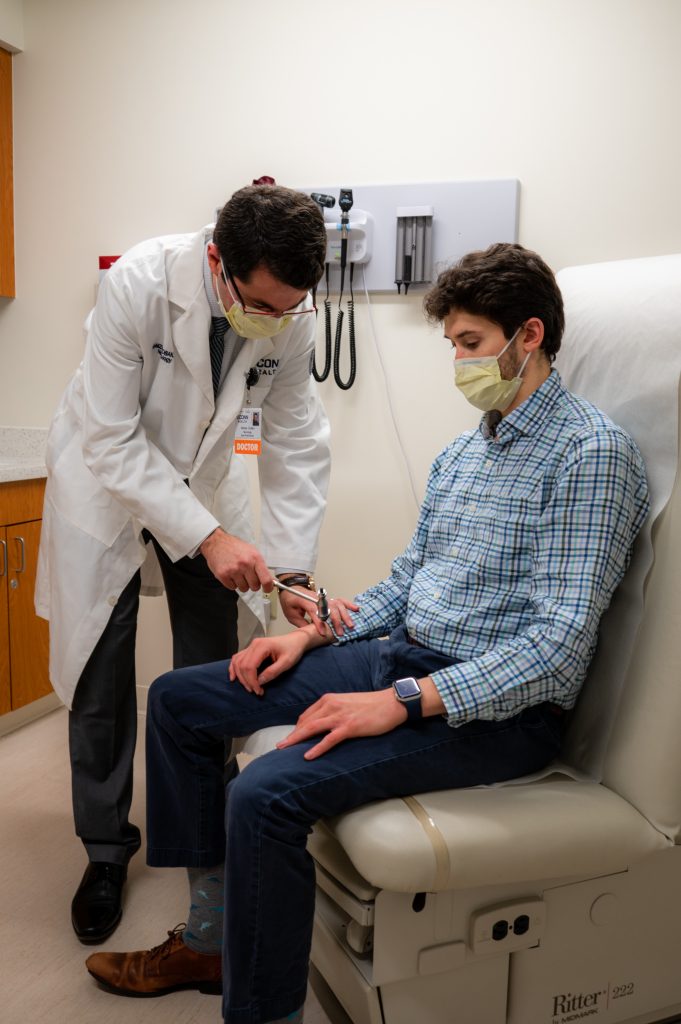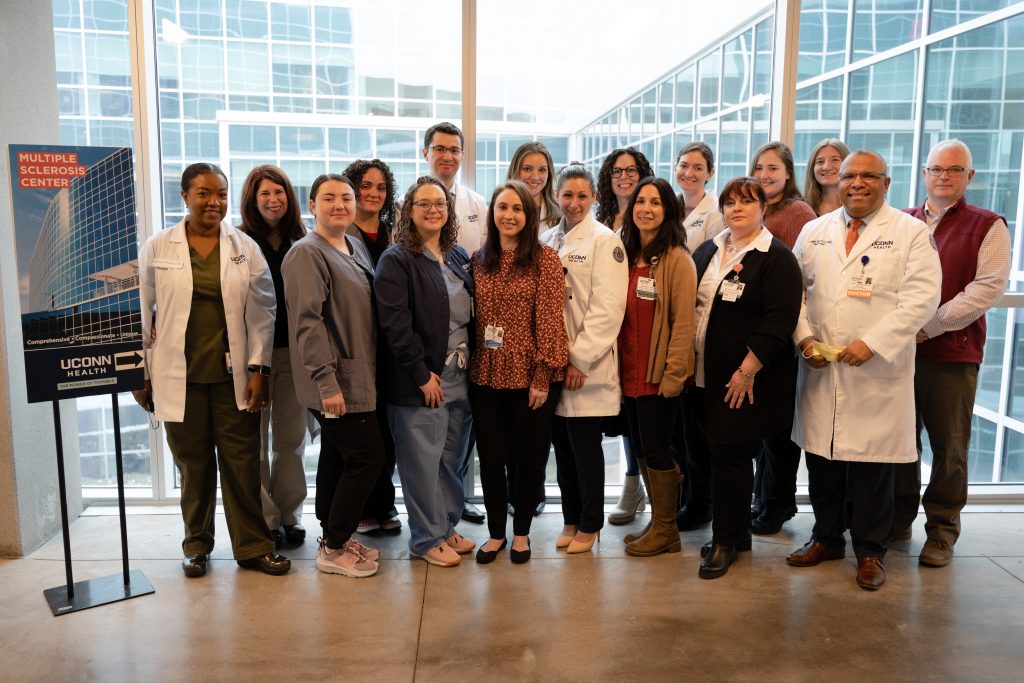By Steven Blackburn
Photography by Tina Encarnacion/UConn Health
Dr. Jaime Imitola’s reason for pursuing the study and treatment of multiple sclerosis (MS) is quite personal. He was a second-year medical student at the time, and his team was treating an MS patient in a country where the disease wasn’t prevalent, so they didn’t have access to effective tools. When his patient passed, Dr. Imitola was greatly affected and endeavored to study the disease as his life’s work, eventually immigrating to the U.S. where MS was—and still is—much more common.
After years of studying neuroimmunology at many top institutions like Harvard Medical School, Dr. Imitola was naturally drawn to UConn Health in Farmington because of the demographic it serves, which includes those who are economically challenged and therefore don’t have access to health insurance. He would have an opportunity to build a team of exceptional colleagues to provide the best care in all the region, which includes underserved communities. Dr. Imitola is the director of the MS Center and chief of the Division of Multiple Sclerosis and Neuroimmunology.
“UConn Health takes care of people who no one else will help,” Dr. Imitola said. “I feel privileged and empowered to work here because we are these patients’ only answer, and we have created a superb team to care for them.”
Dr. Imitola was recruited to establish the MS Center at UConn Health in 2019, building a core collaborative group that would include multiple nurses, two bilingual medical assistants, an infusion center, a social worker, a patient navigator, a clinical coordinator, and two new faculty trained in MS at Ivy League universities. UConn Health’s MS Center grew by 300% in the first year alone. Today it has more than 1,000 patients and continues to grow.
The fact that UConn Health has a nationally recognized MS Center is a testament to the time and effort Dr. Imitola and his team have put in. A designated comprehensive care center for MS must provide excellent care as well as conduct research towards curing the disease. These centers receive accreditation from the MS Society, a nonprofit organization leading the U.S. and the world in care and research for MS.
Dr. Imitola has more than 150 published works. One of his current projects has found that specific changes occur inside MS-afflicted stem cells that prevent them from repairing. He is looking for medications that can bypass this. Dr. Imitola is also endeavoring to generate MS models using patient-derived stem cells to determine whether patients have something unique that can be exploited therapeutically. Additionally, his ongoing studies and personal experiences with patients challenge the generally accepted view of the medical community that MS usually only affects Caucasians. His team is working toward understanding why the disease can be more severe among African American or Hispanic populations. His team is also researching why MS occurs among members of the same family. He collaborates extensively with the Neuroscience Department, creating a rich ecosystem of care and research in MS with more than half a dozen laboratories at UConn Health engaged in cutting-edge clinical and basic research to cure MS.

Receiving national recognition for MS care
The MS Society recognized the UConn Health MS center for its state-of-the-art
care despite the challenges faced during the pandemic. In direct response to COVID-19, the UConn Health MS Center launched multiple initiatives. During the Orange Mask Campaign, the UConn Health team personally visited the houses of patients with the highest risk for COVID to ensure they had masks and provisions. Dr. Imitola was selected by the MS Society to participate in a campaign to help patients with COVID and MS. He led educational campaigns and advisories in both English and Spanish for the last three years, which earned him the 2020 Inspiration Award from the MS Society. His efforts have inspired additional initiatives to lead COVID diagnosis and vaccination campaigns, and to build air purifiers for schools and MS patients, led by Marina A. Creed, a nurse practitioner at the UConn Health MS Center.
A UNIQUE APPROACH
The UConn Health MS team’s approach is to treat MS immediately with effective medication rather than a wait-and-see approach; it is based on research that supports early and effective treatments. All the MS providers at UConn Health are fellowship-trained at top institutions. As a result, the UConn Health MS team regularly treats very complex patients from other hospitals for a second opinion or transfer of care. The center specializes in progressive MS, pregnancy and MS, pediatric MS, and MS in older individuals.
“Based on our experience and research, we know that we have to administer MS medications as soon as possible,” stated Dr. Imitola. “One of the biggest challenges in MS care is to treat patients with MS and other comorbidities. Thanks to collaborations with the UConn Center on Aging, Internal Medicine, the Infectious Diseases Division, the Division of Neurosurgery, Urology, and Connecticut Children’s, we have the experience and the team to treat complex cases of MS and neuroimmunology.”

Understanding each patient’s needs
Patient education and empowerment are significant aspects of the MS Center’s philosophy. This philosophy has been an important driver in creating a unique multidisciplinary onboarding approach at UConn Health, where Dr. Imitola and his team devote 90 minutes to every new patient, giving them an in-depth assessment.
“Even though MS is one disease, every patient suffers from their distinct version of it,” said Dr. Imitola.
To empower patients, the UConn Health MS team educates them on all the possible symptoms and then provides a personalized visit guide created for patients based on his team’s research. This “MS onboarding” process, as Dr. Imitola calls it, serves to educate patients about the unique features of the disease. It is effective in reducing anxiety and depression that occurs in up to 50% of patients newly diagnosed with MS.
“At our follow-up meetings, we go through the explanation of what the disease is, where the lesions are—which we identify through MRIs—the risk factors, and then bring it together with a plan of care to reassure our patients,” Dr. Imitola explained. “Many patients are surprised to learn this from us because their prior doctors didn’t tell them or even show them their MRIs.”
“If you are not diagnosed early or are not treated appropriately, there is going to come a time when it has spread too much,” he said. “To provide a better approach for the patient, you have to invest time in the beginning to fully understand the burden of their disease, the symptoms and the risk factors.”
Bringing much-needed visibility of MS to patients
The UConn Health MS Center mindset has inspired a need to instill awareness in the public about the stigma that those who suffer from MS endure and how this can prevent future MS patients from seeking treatment as soon as possible, which is critical.
“MS symptoms may be invisible to others, and patients who may experience debilitating symptoms may be fearful of relapses,” commented Dr. Imitola. “People spend all their lives safeguarding their ability to work, but when someone is diagnosed with MS, they could lose their job because of the damage caused by MS. Many of them become lonely, depressed, divorced, accumulating pain or even homeless.”
To underscore the urgency of the situation, Dr. Imitola compared MS to other neurological diseases: “Some may happen when you are older. But if you are 20 years old when you get MS, and if it’s severe enough, you can experience years of misery and your life is upended. Despite all of our advances, the treatments aren’t getting to all the people. It is, therefore, our responsibility as institutions like UConn Health to be able to bring this message forward.”

Empowering future patients
Since MS is unique to every patient, Dr. Imitola is endeavoring to ensure that every person—even before they become a patient—is aware of MS symptoms so they can be self-driven and seek care. As Dr. Imitola revealed, society needs to view and treat MS like other urgent diseases, where patients and doctors are proactive in catching the disease early, like diabetes. MS progression can be prevented if caught sooner.
First, MS symptoms usually come and go, which can compel people to delay seeing a neurologist. But before long, other more obvious symptoms will manifest, which is when additional lesions form. But there are early warning signs; between the ages of 15 and 35, more alarming symptoms can occur, like vision loss, numbness in the arms and legs, balance issues, and the inability to walk. Others that go unnoticed include changes in bladder function.
“This is all information that’s already well-documented, but many people are not aware and may have those symptoms but don’t put two and two together and seek care to get an MRI, which is a powerful tool,” noted Dr. Imitola. “MS shouldn’t be difficult to diagnose if you have the appropriate team to help you.”
Educating doctors on MS
Dr. Imitola’s message to general neurologists and primary care physicians is to work more collaboratively.
“They can contact the UConn Health MS Center anytime; we work 24/7 to find cures,” he said. “We have education for patients and providers on our website. Collectively, we must proactively do outreach and education in our communities.”
Additionally, since every patient’s journey is unique, Dr. Imitola is emphatic that doctors must genuinely collaborate with their patients. “About 50 percent of MS patients think doctors need to listen more to their patients, according to one survey,” Imitola said. “If you take a listen, you will find that patients will have invaluable insights into their care.”
Dr. Imitola is driven to ensure a change in culture at the national level. He will direct the first course in the annual meeting of the American Academy of Neurology, attended by thousands of neurologists every year, to teach about MS diagnosis and treatment in a diverse population.
“MS is not a required teaching in medicine, so unless medical students or neurology residents are interested in MS, the majority of doctors will not be exposed,” he revealed. “It’s becoming clear that there’s a need for more and better training.”
“In the end, there is no good institution without a good team,” Dr. Imitola concluded. “This is a team effort, and I have the privilege to be surrounded by great and supportive institution and colleagues; everyone participates. We have created an ‘MS culture’ at UConn Health. I am privileged to work with a great team and hope we are doing some good for the community. It’s one day at a time.”






More Stories
From Hall High to the Heart of Saint Francis: Dr. DeSimone Comes Home
Jamie Shawver, D.O.: The Modern-Day Family Doctor
Leading in Urologic Oncology: Ryan Dorin, M.D., Works on Expanding Patient Care